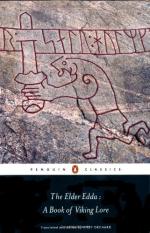|
This section contains 7,880 words (approx. 20 pages at 400 words per page) |

|
Lee M. Hollander, in this article from The Poetic Edda, attributes the preservation of the Teutonic race's literary heritage to the early Christian missionaries, and specifically, to Iceland, whose inhabitants contributed greatly to capturing the wonders of the Viking Age, its sagas and Eddic lays.
What the Vedas are for India, and the Homeric poems for the Greek world, that the Edda signifies for the Teutonic race: it is a repository, in poetic form, of their mythology and much of their heroic lore, bodying forth both the ethical views and the cultural life of the North during late heathen and early Christian times.
Due to their geographical position, it was the fate of the Scandinavian tribes to succumb later than their southern and western neighbors to the revolutionary influence of the new world religion, Christianity. Before its establishment, they were able to bring to a highly characteristic...
|
This section contains 7,880 words (approx. 20 pages at 400 words per page) |

|




